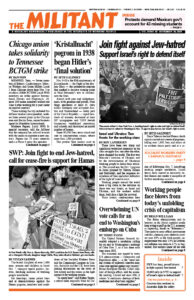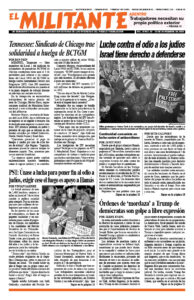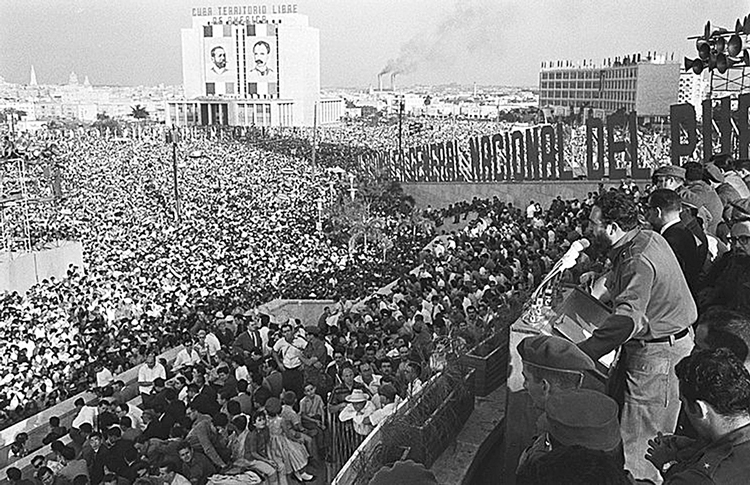The United Nations General Assembly adopted a resolution calling for an end to Washington’s embargo of Cuba Nov. 2, as it has done each year since 1992.
The economic war waged by every U.S. administration — Democratic and Republican alike — is the “most lasting system of unilateral coercive measures ever applied against any country,” Bruno Rodríguez Parrilla, Cuba’s minister of foreign affairs, told the assembly meeting. Carried out since 1961, it creates “a continuous shortage of food, medicines and other basic supplies.”
He pointed to an April 6, 1960, memorandum by U.S. Deputy Assistant Secretary of State Lester Mallory that proposed the embargo. Mallory called for measures that make “the greatest inroads in denying money and supplies to Cuba, to decrease monetary and real wages, to bring about hunger, desperation and overthrow of government.”
“That is the nature and those are, from its origins until today, the purposes of the economic coercion and maximum pressure applied by the current U.S. government,” Rodríguez said.
Six decades after Democratic President John F. Kennedy imposed the embargo, the Cuban people still refuse to bow to Washington’s diktats. They successfully defeated a U.S.-orchestrated invasion at the Bay of Pigs in 1961. They remained steadfast as the Kennedy administration brought the world to the brink of a nuclear war in 1962 in its drive to topple the Cuban government.
Washington is determined to end the example the leadership of Cuba’s socialist revolution sets for tens of millions in Latin America, the U.S. and worldwide.
Fidel Castro and the July 26th Movement led working people in their millions to conquer political power. They mobilized the toiling population of Cuba to take over the factories, fields and banks, and to run society to meet the needs of the vast majority. They eradicated illiteracy, uprooted racial segregation and organized an unparalleled expansion of women’s participation in all social and economic life. The conditions and lives of millions of working people were transformed, as was their understanding of their own capacities.
Since 2019, under former President Donald Trump, “the U.S. government has escalated the siege against our country to an extreme dimension,” Rodríguez told the General Assembly. He pointed to “wartime measures to try to prevent fuel supplies to Cuba, stepped-up attacks against Cuban international medical cooperation, and increased harassment of commercial and financial transactions in third markets.”
He said President Joseph Biden has continued these policies.
U.S. Ambassador Paul Folmsbee tried to counter this stark picture, claiming, “U.S. sanctions include exemptions and authorizations relating to the exports of food, medicine and other humanitarian goods.”
“The U.S. government is lying,” Rodríguez said. He described how it blocked U.S. companies from supplying Cuba with medical oxygen when the island’s main oxygen-production plant broke down at the height of the pandemic. Washington also prevented companies in Europe from exporting ventilators to Cuba.
The embargo “curtails the freedom of U.S. citizens to travel to Cuba,” Rodríguez said, “and form their own opinion.”
Governments from 187 countries voted for the motion to end the punishing sanctions, with the U.S. and Israel voting against the motion and Ukraine abstaining. Representatives of 44 governments made statements to the assembly condemning the embargo.
“The arbitrary and unjustifiable inclusion of Cuba on list of state sponsors of terror,” said Egriselda López, El Salvador’s ambassador to the U.N., “must cease.”
“Unselfish assistance from Cuba to Saint Lucia, the wider Caribbean and globally is legendary,” said Menissa Rambally, the representative from Saint Lucia. “Saint Lucia will always stand with Cuba.”
“Cuba was a steadfast ally of Namibia in our fight for independence,” said Namibia’s ambassador, Audrey Gantana. Some 375,000 internationalist combatants from Cuba played a key role in defeating repeated invasions of Angola by South Africa’s apartheid rulers between 1975 and 1991. That victory paved the way for Namibia’s independence and the fall of apartheid in South Africa.


